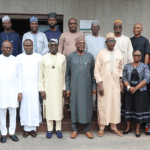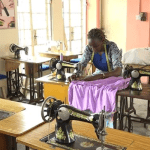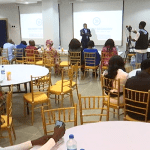As the search for gainful employment becomes more daunting for Nigerian youths, they are seeking alternatives in skills and small-scale businesses.
Some key players who spoke with Senior Correspondent, Sharon Ijasan in the wake of the KPMG’s reports that more than 40 percent of Nigerians are unemployed, said government must expand businesses and revive moribund industries to change the situation.
As unemployment rate continues to rise in Nigeria, experts predicted that it will increase further to 40.6 percent in 2023.
In the face of this, my team and I went in search of unemployed Nigerians, willing to share their experience.
I met Blessing Adebusoye and other unemployed persons in Lagos, South-West Nigeria.
Blessing is a graduate of Psychology from the Obafemi Awolowo University, Ile-Ife.
She narrates the peculiar challenges an average person encounters while job hunting in the country.
The National Bureau of Statistics, NBS said the country‘s unemployment rate stood at 33.3 per cent, as at the fourth quarter of 2020.
Those who are employed are also finding things in the country not rousy.
Nigeria’s spiraling inflation rate has eroded the value of the 30,000 naira monthly minimum wage by more than 40 per cent since 2019.
Prices of food and other essential items continue to soar higher in the market.
It is projected that Nigeria’s Gross Domestic Product, GDP will grow at a relatively slow pace of three percent in 2023.
With political transition in May, naira redesign policy introduced by the Central Bank of Nigeria, CBN, foreign exchange crisis, high debt profile and huge debt service payments, the economic outlook appears bleak.
According to research, the value of 30 thousand naira minimum wage, which was 82 dollars in 2019, has dropped to 41 dollars.
Consumer price inflation has heightened, becoming one of the highest in the world.
For Blessing who has taken up a skill in fashion designing just like many other unemployed youths, strategic economic policies will help boost small scale businesses and create new jobs.
As the search for gainful employment becomes more daunting for Nigerian youths, they are seeking alternatives in skills and small-scale businesses.
Some key players who spoke with Senior Correspondent, Sharon Ijasan in the wake of the KPMG’s reports that more than 40 percent of Nigerians are unemployed, said government must expand businesses and revive moribund industries to change the situation.
As unemployment rate continues to rise in Nigeria, experts predicted that it will increase further to 40.6 percent in 2023.
In the face of this, my team and I went in search of unemployed Nigerians, willing to share their experience.
I met Blessing Adebusoye and other unemployed persons in Lagos, South-West Nigeria.
Blessing is a graduate of Psychology from the Obafemi Awolowo University, Ile-Ife.
She narrates the peculiar challenges an average person encounters while job hunting in the country.
The National Bureau of Statistics, NBS said the country‘s unemployment rate stood at 33.3 per cent, as at the fourth quarter of 2020.
Those who are employed are also finding things in the country not rousy.
Nigeria’s spiraling inflation rate has eroded the value of the 30,000 naira monthly minimum wage by more than 40 per cent since 2019.
Prices of food and other essential items continue to soar higher in the market.
It is projected that Nigeria’s Gross Domestic Product, GDP will grow at a relatively slow pace of three percent in 2023.
With political transition in May, naira redesign policy introduced by the Central Bank of Nigeria, CBN, foreign exchange crisis, high debt profile and huge debt service payments, the economic outlook appears bleak.
According to research, the value of 30 thousand naira minimum wage, which was 82 dollars in 2019, has dropped to 41 dollars.
Consumer price inflation has heightened, becoming one of the highest in the world.
For Blessing who has taken up a skill in fashion designing just like many other unemployed youths, strategic economic policies will help boost small scale businesses and create new jobs.
As the search for gainful employment becomes more daunting for Nigerian youths, they are seeking alternatives in skills and small-scale businesses.
Some key players who spoke with Senior Correspondent, Sharon Ijasan in the wake of the KPMG’s reports that more than 40 percent of Nigerians are unemployed, said government must expand businesses and revive moribund industries to change the situation.
As unemployment rate continues to rise in Nigeria, experts predicted that it will increase further to 40.6 percent in 2023.
In the face of this, my team and I went in search of unemployed Nigerians, willing to share their experience.
I met Blessing Adebusoye and other unemployed persons in Lagos, South-West Nigeria.
Blessing is a graduate of Psychology from the Obafemi Awolowo University, Ile-Ife.
She narrates the peculiar challenges an average person encounters while job hunting in the country.
The National Bureau of Statistics, NBS said the country‘s unemployment rate stood at 33.3 per cent, as at the fourth quarter of 2020.
Those who are employed are also finding things in the country not rousy.
Nigeria’s spiraling inflation rate has eroded the value of the 30,000 naira monthly minimum wage by more than 40 per cent since 2019.
Prices of food and other essential items continue to soar higher in the market.
It is projected that Nigeria’s Gross Domestic Product, GDP will grow at a relatively slow pace of three percent in 2023.
With political transition in May, naira redesign policy introduced by the Central Bank of Nigeria, CBN, foreign exchange crisis, high debt profile and huge debt service payments, the economic outlook appears bleak.
According to research, the value of 30 thousand naira minimum wage, which was 82 dollars in 2019, has dropped to 41 dollars.
Consumer price inflation has heightened, becoming one of the highest in the world.
For Blessing who has taken up a skill in fashion designing just like many other unemployed youths, strategic economic policies will help boost small scale businesses and create new jobs.
As the search for gainful employment becomes more daunting for Nigerian youths, they are seeking alternatives in skills and small-scale businesses.
Some key players who spoke with Senior Correspondent, Sharon Ijasan in the wake of the KPMG’s reports that more than 40 percent of Nigerians are unemployed, said government must expand businesses and revive moribund industries to change the situation.
As unemployment rate continues to rise in Nigeria, experts predicted that it will increase further to 40.6 percent in 2023.
In the face of this, my team and I went in search of unemployed Nigerians, willing to share their experience.
I met Blessing Adebusoye and other unemployed persons in Lagos, South-West Nigeria.
Blessing is a graduate of Psychology from the Obafemi Awolowo University, Ile-Ife.
She narrates the peculiar challenges an average person encounters while job hunting in the country.
The National Bureau of Statistics, NBS said the country‘s unemployment rate stood at 33.3 per cent, as at the fourth quarter of 2020.
Those who are employed are also finding things in the country not rousy.
Nigeria’s spiraling inflation rate has eroded the value of the 30,000 naira monthly minimum wage by more than 40 per cent since 2019.
Prices of food and other essential items continue to soar higher in the market.
It is projected that Nigeria’s Gross Domestic Product, GDP will grow at a relatively slow pace of three percent in 2023.
With political transition in May, naira redesign policy introduced by the Central Bank of Nigeria, CBN, foreign exchange crisis, high debt profile and huge debt service payments, the economic outlook appears bleak.
According to research, the value of 30 thousand naira minimum wage, which was 82 dollars in 2019, has dropped to 41 dollars.
Consumer price inflation has heightened, becoming one of the highest in the world.
For Blessing who has taken up a skill in fashion designing just like many other unemployed youths, strategic economic policies will help boost small scale businesses and create new jobs.
As the search for gainful employment becomes more daunting for Nigerian youths, they are seeking alternatives in skills and small-scale businesses.
Some key players who spoke with Senior Correspondent, Sharon Ijasan in the wake of the KPMG’s reports that more than 40 percent of Nigerians are unemployed, said government must expand businesses and revive moribund industries to change the situation.
As unemployment rate continues to rise in Nigeria, experts predicted that it will increase further to 40.6 percent in 2023.
In the face of this, my team and I went in search of unemployed Nigerians, willing to share their experience.
I met Blessing Adebusoye and other unemployed persons in Lagos, South-West Nigeria.
Blessing is a graduate of Psychology from the Obafemi Awolowo University, Ile-Ife.
She narrates the peculiar challenges an average person encounters while job hunting in the country.
The National Bureau of Statistics, NBS said the country‘s unemployment rate stood at 33.3 per cent, as at the fourth quarter of 2020.
Those who are employed are also finding things in the country not rousy.
Nigeria’s spiraling inflation rate has eroded the value of the 30,000 naira monthly minimum wage by more than 40 per cent since 2019.
Prices of food and other essential items continue to soar higher in the market.
It is projected that Nigeria’s Gross Domestic Product, GDP will grow at a relatively slow pace of three percent in 2023.
With political transition in May, naira redesign policy introduced by the Central Bank of Nigeria, CBN, foreign exchange crisis, high debt profile and huge debt service payments, the economic outlook appears bleak.
According to research, the value of 30 thousand naira minimum wage, which was 82 dollars in 2019, has dropped to 41 dollars.
Consumer price inflation has heightened, becoming one of the highest in the world.
For Blessing who has taken up a skill in fashion designing just like many other unemployed youths, strategic economic policies will help boost small scale businesses and create new jobs.
As the search for gainful employment becomes more daunting for Nigerian youths, they are seeking alternatives in skills and small-scale businesses.
Some key players who spoke with Senior Correspondent, Sharon Ijasan in the wake of the KPMG’s reports that more than 40 percent of Nigerians are unemployed, said government must expand businesses and revive moribund industries to change the situation.
As unemployment rate continues to rise in Nigeria, experts predicted that it will increase further to 40.6 percent in 2023.
In the face of this, my team and I went in search of unemployed Nigerians, willing to share their experience.
I met Blessing Adebusoye and other unemployed persons in Lagos, South-West Nigeria.
Blessing is a graduate of Psychology from the Obafemi Awolowo University, Ile-Ife.
She narrates the peculiar challenges an average person encounters while job hunting in the country.
The National Bureau of Statistics, NBS said the country‘s unemployment rate stood at 33.3 per cent, as at the fourth quarter of 2020.
Those who are employed are also finding things in the country not rousy.
Nigeria’s spiraling inflation rate has eroded the value of the 30,000 naira monthly minimum wage by more than 40 per cent since 2019.
Prices of food and other essential items continue to soar higher in the market.
It is projected that Nigeria’s Gross Domestic Product, GDP will grow at a relatively slow pace of three percent in 2023.
With political transition in May, naira redesign policy introduced by the Central Bank of Nigeria, CBN, foreign exchange crisis, high debt profile and huge debt service payments, the economic outlook appears bleak.
According to research, the value of 30 thousand naira minimum wage, which was 82 dollars in 2019, has dropped to 41 dollars.
Consumer price inflation has heightened, becoming one of the highest in the world.
For Blessing who has taken up a skill in fashion designing just like many other unemployed youths, strategic economic policies will help boost small scale businesses and create new jobs.
As the search for gainful employment becomes more daunting for Nigerian youths, they are seeking alternatives in skills and small-scale businesses.
Some key players who spoke with Senior Correspondent, Sharon Ijasan in the wake of the KPMG’s reports that more than 40 percent of Nigerians are unemployed, said government must expand businesses and revive moribund industries to change the situation.
As unemployment rate continues to rise in Nigeria, experts predicted that it will increase further to 40.6 percent in 2023.
In the face of this, my team and I went in search of unemployed Nigerians, willing to share their experience.
I met Blessing Adebusoye and other unemployed persons in Lagos, South-West Nigeria.
Blessing is a graduate of Psychology from the Obafemi Awolowo University, Ile-Ife.
She narrates the peculiar challenges an average person encounters while job hunting in the country.
The National Bureau of Statistics, NBS said the country‘s unemployment rate stood at 33.3 per cent, as at the fourth quarter of 2020.
Those who are employed are also finding things in the country not rousy.
Nigeria’s spiraling inflation rate has eroded the value of the 30,000 naira monthly minimum wage by more than 40 per cent since 2019.
Prices of food and other essential items continue to soar higher in the market.
It is projected that Nigeria’s Gross Domestic Product, GDP will grow at a relatively slow pace of three percent in 2023.
With political transition in May, naira redesign policy introduced by the Central Bank of Nigeria, CBN, foreign exchange crisis, high debt profile and huge debt service payments, the economic outlook appears bleak.
According to research, the value of 30 thousand naira minimum wage, which was 82 dollars in 2019, has dropped to 41 dollars.
Consumer price inflation has heightened, becoming one of the highest in the world.
For Blessing who has taken up a skill in fashion designing just like many other unemployed youths, strategic economic policies will help boost small scale businesses and create new jobs.
As the search for gainful employment becomes more daunting for Nigerian youths, they are seeking alternatives in skills and small-scale businesses.
Some key players who spoke with Senior Correspondent, Sharon Ijasan in the wake of the KPMG’s reports that more than 40 percent of Nigerians are unemployed, said government must expand businesses and revive moribund industries to change the situation.
As unemployment rate continues to rise in Nigeria, experts predicted that it will increase further to 40.6 percent in 2023.
In the face of this, my team and I went in search of unemployed Nigerians, willing to share their experience.
I met Blessing Adebusoye and other unemployed persons in Lagos, South-West Nigeria.
Blessing is a graduate of Psychology from the Obafemi Awolowo University, Ile-Ife.
She narrates the peculiar challenges an average person encounters while job hunting in the country.
The National Bureau of Statistics, NBS said the country‘s unemployment rate stood at 33.3 per cent, as at the fourth quarter of 2020.
Those who are employed are also finding things in the country not rousy.
Nigeria’s spiraling inflation rate has eroded the value of the 30,000 naira monthly minimum wage by more than 40 per cent since 2019.
Prices of food and other essential items continue to soar higher in the market.
It is projected that Nigeria’s Gross Domestic Product, GDP will grow at a relatively slow pace of three percent in 2023.
With political transition in May, naira redesign policy introduced by the Central Bank of Nigeria, CBN, foreign exchange crisis, high debt profile and huge debt service payments, the economic outlook appears bleak.
According to research, the value of 30 thousand naira minimum wage, which was 82 dollars in 2019, has dropped to 41 dollars.
Consumer price inflation has heightened, becoming one of the highest in the world.
For Blessing who has taken up a skill in fashion designing just like many other unemployed youths, strategic economic policies will help boost small scale businesses and create new jobs.














